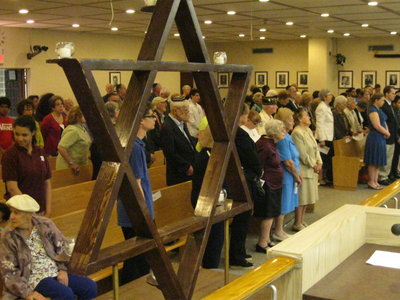First the flags came, and then the candles, old veterans clinging to the patriotic colors while young students held their hands around the flickering flame that was to symbolize memories of horrors passed, but not forgotten.
Each year, the community gathers in City Hall to mark Yom Hashoah, or Holocaust Remembrance Day, which is an annual event usually held around the anniversary of the Warsaw Uprising in 1943.
The historic event becomes more important each year as those with living memories of the Nazis’ atrocities pass away, and the community seeks to pass along these tales of outrage with the hope that future generations will keep it from happening again.
Of dozens that once lived in the area with a living memory of the horrors of that time, only four still live in Bayonne: Luba Woloski, Katie Berces, Regina Resnick, and Sally Friedman, all of whom returned again this year to continue to effort to keep the memory alive.
Bayonne, according Dr. Joseph Ryan, who served as moderator for this year’s ceremony, is one of the few places where this event is held in a municipal council chambers.
Held this year on April 17, the event featured guest speaker Fanya Heller, a survivor of the Holocaust, who recounted her story in book called “Love in a World of Sorrow: A Teenage Girl’s Holocaust Memoir.”
Heller is a Holocaust survivor, author and educator who survived the horrors of the Holocaust by hiding from the Nazis with the help of two Christian rescuers. Her life story was designed to help those who suffered through discrimination and the horrors of war. Born in a small Ukrainian village in 1924, she and her family hid from Nazi death squads with help. Nearly always hungry and marked for death, they were constantly in fear of discovery.
More than a decade-old tradition in Bayonne
The Jewish community enacts this gathering to remember those that suffered, those that fought, and those that died during the worst act of mass genocide in modern history.
Each year, members of the Bayonne community come together to sing, pray, and recall the horrors inflicted on the Jewish people and other victims. The ceremony has been held in the municipal building since 1979, and is part of a worldwide effort to remind the general public of the systematic slaughter of six million Jews and five million others.
The Holocaust was the systematic, bureaucratic, state-sponsored persecution and murder of Europe’s Jews by the Nazi regime and its collaborators. Also targeted were gypsies, the handicapped, some Slavic people, communists, socialists, Jehovah’s Witnesses, and homosexuals. Yet of all those targeted, Jews suffered the most extreme loss of life, with nearly two out of every three European Jews murdered by the end of World War II.
Although the Jewish community recognizes the Holocaust as beginning with the rise of Adolph Hitler as the dictator of the Third Reich in 1932, the mass murder began in March 1942.
When the killing ended, those who survived were released from concentration camps and came out of hiding. Vowing to keep the memory alive for future generations, the Jewish community established Yom Hashoah.
“We are not just here to immortalize those who perished, but also how to understand how frail democracy is.” – Mayor Mark Smith
__________
Those who helped
The Rev. Rose Choen Hassan said the theme for Yom Hashoah this year was “Choosing to Act,” recalling the stories of rescue. She said many of the people who aided victims of the Holocaust were ordinary people who did heroic things.
“Many rescuers did not see themselves as that way,” she said, noting that people in one French village refused to accept praise for hiding 5,000 Jews.
Mayor Mark Smith said that as mayor he has no more important an obligation than to attend this event each year.
“It is a grim reminder of man’s humanity to man,” he said. “But it also reminds us what happens when no one stands up against these things.”
Smith said it is important to pass on these tales of horror to future generations and instill in the next generation the importance of remembering.
“We are not just here to immortalize those who perished, but also how to understand how frail democracy is, and how, once the Nazis did away with democracy, they started these horrors.”
Council President Terrence Ruane said he had been stationed in the Germany when he served in the U.S. military, at which time he had the opportunity to visit the death camps.
“They had a profound effect on me and stayed with me 45 years later,” he said, and also said people need to keep the memory alive.
“We are seeing few people who have memories of these things,” he said. “We must keep these memories alive.”
In her keynote speech, Heller recalled that some of the experiences and how some things made animals of civilized people, hunger driving people to do things they did not do in normal life.
